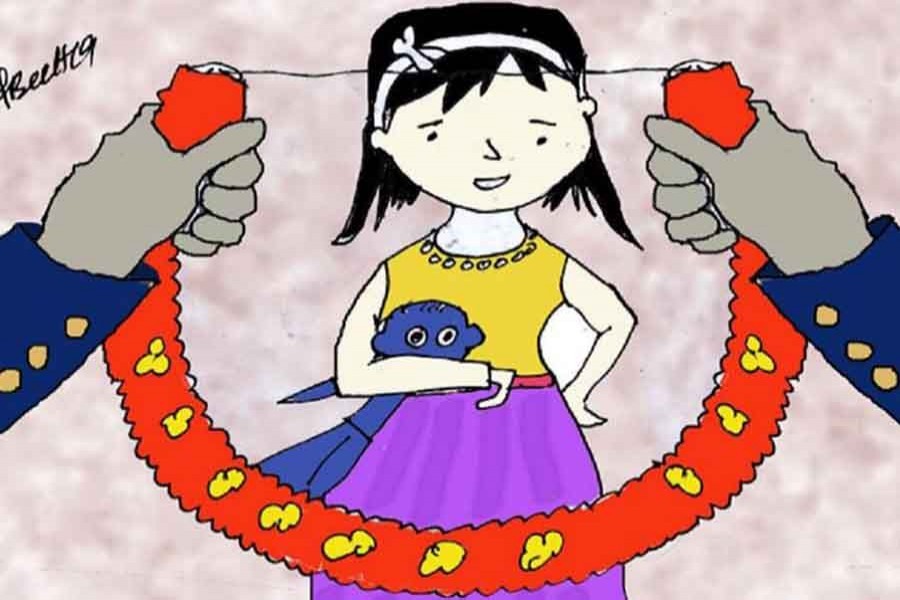Child marriage surges in Bangladesh during pandemic
Financial and social security concerns amid school closure prompt parents to marry off early teenage girls

Published :
Updated :

The progress the country has made in reducing child marriage and girls’ education over the decades may be reversed due to effects of the Covid-19 on the poor and rural people, on-going social research suggests.
Researchers say the families that earlier sent their girl children to schools have started arranging their marriage defying health restrictions in recent months.
Increasing joblessness, rise in poverty, growing food insecurity, school closure, and a sense of insecurity among parents are found to be reasons of the recent surge in child marriage.
It marked as high as 84 per cent rise in the past nine months, according to one monitoring report, which expressed apprehensions of increase in child marriage in a quiet manner.
The rate of rise in child marriage in nine months till September was derived from the number of incidents and attempts prevented by Polli Shomaj, the community-based women's group of BRAC. BRAC’s Community Empowerment Programme (CEP) compiled the data this month.
Development activists fear Bangladesh may miss the target of eliminating child marriage by 2041 and also the targets of education for all girls.
Bangladesh has a poor global ranking, 8th from the bottom, and the worst in South Asia with a 51 per cent child marriage rate, according to UN reports.
Still, the country has attained more than 90 per cent enrolment of girls with primary schools and around 55 per cent with secondary schools in recent decades, a progress which led to a decrease in child marriage.
The BRAC’s report observed that the current situation reduced windows of opportunities for girls and increased the likelihood of early marriage.
It is hardly likely that all the girls who were regular students before the pandemic, would return to school after the crisis is over.
The BRAC report recorded a total of 778 child marriage incidents, of which 683 were prevented immediately, between January and September this year. Polli Shomaj managed to stop 371 out of 460 attempted child marriage incidents in 2019, according to the report.

Jannat Akhtar, a girl of Moulvibazar municipality, is one of thousands of recent victims of child marriage. The seventh grade-student was forced to marry despite efforts by the Polli Shomaj to stop it.
Jannat’s mother, an expatriate working in Saudi Arabia, was hardly sending money recently. Her father, a rickshaw-puller, struggled to run his five-member family.
However, Jannat has now returned to her father’s house as her husband sent her back demanding dowry, Allika Das, a community leader at the Polli Shomaj, said narrating the story of Jannat to The Financial Express. Jannat’s was the ninth case of child marriage Allika Das witnessed and tried to stop with the help of local administration this year.
“We usually hear about 20 per cent of the child marriage cases,” Anna Minj, BRAC- CEP director, told this correspondent.
Based on consultations with the parents, she concluded that drops in family income, school shutdown, social insecurity of girls, and fear among parents of violence contributed to a rise in child marriage in recent times.
In some cases, she added, offers from Bangladeshi expats instigated many parents ‘not to miss a solvent groom’.
“We don’t think, many of the female students will resume classes when schools are reopened,” she expressed her apprehensions.
Worldwide, almost 10 million children may never return to schools, according to UNICEF.
ActionAid Bangladesh Manager Morium Nesa said, “We didn’t face such a huge pressure for child marriage before the pandemic. Now, many parents are hardly convinced about not allowing child marriage.”
Household income declined by 20 per cent and expenditure by 6.14 per cent in March-August period, according to Bangladesh Bureau of Statistics (BBS). It also found that the rate of poverty rose to 29.4 per cent during the pandemic from 18.8 per cent estimated before the outbreak of the Covid-19.
The Ministry of Women and Children Affairs official Md. Muhibuzzaman admitted that there is a tendency of rising child marriages and school dropouts during the pandemic.
“We don’t have official data which can support such claims. Besides, we could do little if two families arrange marriage secretly to avoid legal bindings,” he told The FE.
However, Mr Muhibuzzaman, a deputy secretary, mentioned that the government did not stop any stipend allowance for students, or free distribution of books and foods and money to encourage people to make sure that children do not drop out of school or parents do not arrange early marriage.


 For all latest news, follow The Financial Express Google News channel.
For all latest news, follow The Financial Express Google News channel.